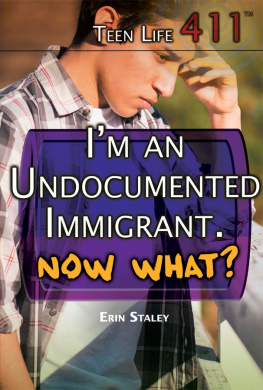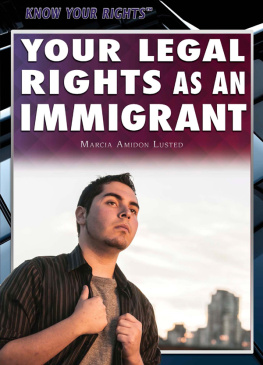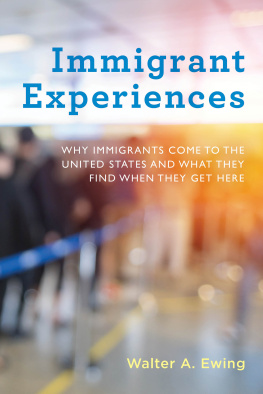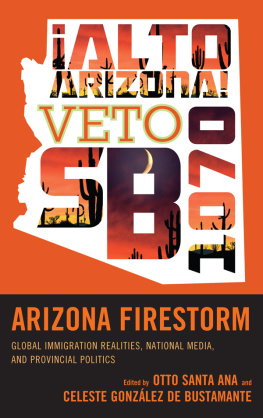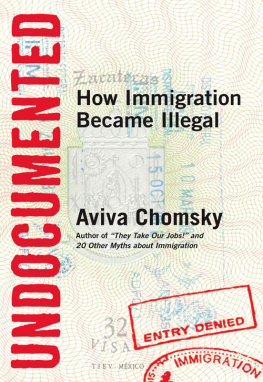The DREAMers
How the Undocumented Youth Movement Transformed the Immigrant Rights Debate
Walter J. Nicholls
Stanford University Press
Stanford, California
Stanford University Press
Stanford, California
2013 by the Board of Trustees of the Leland Stanford Junior University.
All rights reserved.
No part of this book may be reproduced or transmitted in any form or by any means, electronic or mechanical, including photocopying and recording, or in any information storage or retrieval system without the prior written permission of Stanford University Press.
Printed in the United States of America on acid-free, archival-quality paper.
Library of Congress Cataloging-in-Publication Data
Nicholls, Walter, author.
The DREAMers : how the undocumented youth movement transformed the immigrant rights debate / Walter J. Nicholls.
pages cm
Includes bibliographical references and index.
ISBN 978-0-8047-8703-1 (cloth : alk. paper)
ISBN 978-0-8047-8884-7 (pbk. : alk. paper)
1. Immigrant youthPolitical activityUnited States. 2. Illegal aliensPolitical activityUnited States. 3. Immigrant youthCivil rightsUnited States. 4. ImmigrantsCivil rightsUnited States. 5. Youth protest movementsUnited States. I. Title.
JV6477.N53 2013
325.73dc23
2013011191
ISBN 978-0-8047-8869-4 (electronic)
To Marie
Contents
Figures
Acknowledgments
This book is the result of a web of personal and professional relations stretching across many years. While it would be impossible to pinpoint the precise contribution of each person who has given to this project, I would like to acknowledge the importance of some people who made this book possible in one way or another.
I began to study immigrant rights campaigns as a graduate student at the University of California, Los Angeles. Edward Soja provided important support for my early research on immigrant and labor campaigns in Los Angeles. My first colleagues at California State University, Long Beach, especially Norma Chinchilla, Gary Hytrek, and Christine Zentgraf, reinforced my interests in immigration politics in Southern California.
In 2006 much of my attention shifted to the struggles of undocumented immigrants in France. This research showed how families struggled to assert rights claims in a country that was becoming more inhospitable by the day. With almost no resources, immigrants came out of the shadows, occupied public places, faced off against aggressive police and political adversaries, and slowly cobbled together a network of supportive allies. Through my conversations with many activists, I learned that in spite of severe challenges, there was still room for extremely marginalized immigrants to build broad support among the public and leverage this support to win concessions from a hostile government. I extend my deepest gratitude to all those activists and advocates in France who spent hours teaching me the lessons of their struggles. This was the most important educational experience of my life. It provided me with the intellectual foundations needed to study the undocumented youth movement in the United States.
After moving to the University of Amsterdam in 2009, I continued to study immigrant mobilizations in France, but my attention also turned to the struggles of undocumented youth in the United States. As I took the first steps in this direction, certain people played crucial roles in introducing me to the vibrant world of immigrant youth activists. Pablo Alvarado of the National Day Laborer Organizing Network and Victor Narro and Kent Wong of the UCLA Labor Center played important roles in orienting me and introducing me to several key actors in the field.
This project could not have been done without the participation of youth activists who have worked tirelessly to advance the rights of immigrants in the United States. Youth activists affiliated with the California Dream Network and the California Immigrant Youth Justice Alliance were critical in providing information and insight into this movement. In addition to being extraordinary activists, they are also rigorous analysts of immigration politics and the mechanics of the struggle. They displayed enormous patience in teaching me the histories, trials, and complexities of the movement. I must give a special thanks to Dream Team Los Angeles. This organization welcomed two of my Dutch graduate students, Tara Fiorito and Dirk Eisema, to observe and participate in their activities during a five-month period. The members of Dream Team Los Angeles taught Tara and Dirk the ins and outs of grassroots politics and introduced them to the pleasures of Los Angeles. Tara, Dirk, and I are especially thankful to the following DREAMers for their support and friendship: Carlos Amador, Jose Beltran, Sofia Campos, Neidi Dominguez, Erick Huerta, Adrian Gonzalez, Jorge Gutierrez, Graciela Marquez, Nancy Meza, Jonathan Perez, Bupendra Ram, and Mariella Saba. I am forever grateful for their hospitality. If only more people could be as generous to strangers in a new land as these DREAMers were to my students! Also, I would like to thank Pocho-One and Julio Salgado who agreed to have their wonderful art be a part of this book.
The Department of Sociology at the University of Amsterdam proved to be an ideal environment to write this kind of book. The Programme Group on the Dynamics of Citizenship and Culture in the department provided important sources of funding to finance the field research. Our administrator, Cristina Garofalo, arranged for a teaching schedule that allowed me to spend time in the field and write up the findings. Colleagues, including Christian Broer, Jan Willem Duyvendak, Jan Rath, Evelien Tonkens, Nico Wilterdink, Olav Velthuis, Imrat Verhoeven, among many others, have provided important feedback on various papers, proposals, and presentations. I am especially grateful to Sbastien Chauvin, Olga Sezneva, Floris Vermeulen, and Jarrett Zigon, who were particularly generous with their time and insights. I would also like to thank my good friend Justus Uitermark of the Erasmus University of Rotterdam. Without our many conversations, I would have produced a very different book. Lastly, I would like to thank my students at the University of Amsterdam. Our discussions during the immigration and urban sociology seminars helped me work out a number of important theoretical knots.
Several student researchers provided crucial assistance. Sophie Roussel spent months collecting and organizing newspaper accounts and statements on the immigrant rights movement. She was an enthusiastic, bright, and effective assistant throughout this process. Tara Fiorito and Dirk Eisema performed additional interviews with youth activists and embedded themselves with Dream Team Los Angeles for five months. They embraced their roles as participant observers, gained the respect of the DREAMers, and showed great rigor in their research. They sent timely copies of their reports and provided constant Skype updates from the field. Their interpretations and analyses helped me think through the empirical material and develop several theoretical assertions. I would also like to thank the editorial team at Stanford University Press. Kate Wahl, Frances Malcolm, and Tim Roberts contributed to the slow process of transforming the early manuscript into a publishable book. Producing this work has certainly been a team effort.
My family has been an enormous source of support. Over the years my mother, Ana Maria Nicholls, nudged me to do what needed to be done. Her pragmatic advice helped to keep me on track in the face of many tempting tangents. My father, Julio Nicholls, stoked my interest in politics, books, and storytelling. For the last ten years he has been asking when I was going to write a book. I hope this work satisfies his expectations. My sister, Sharon Nicholls, has long been a major source of inspiration. For years she has worked with working-class immigrants in Los Angeles, first as an activist and then as an elementary-school teacher. Her deep commitment to social justice encouraged me to continue studying immigrant rights activism. I was also fortunate to have had an extended family with a rich sociological and political imagination. My aunt, Cecilia Menjvar, has dedicated her professional life to the study of immigrants in the United States. She has provided excellent feedback on countless papers and chapters. I could not have asked for a better mentor and colleague. My uncles, Oscar and Rolando Menjvar, provided me with an exceptional education in politics. At an early age my uncle, Rolando Menjvar, took me to demonstrations in Los Angeles to protest US military intervention in El Salvadors civil war. My other uncle, Oscar Menjvar, patiently tutored me in the twists and turns of Latin American politics. This socialization implanted an unwavering passion for politics. I would also like to express my deepest gratitude to my French family. My in-laws, Jacques and Anne Vandendries, have been enormously supportive of my academic work. They made their apartment in La Rochelle, France, available for long writing stints and helped my wife, Marie, with our children during extended periods in the field.
Next page

